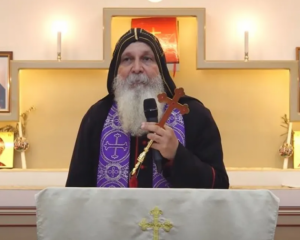The impromptu campaign rally ended not with cheers but panic as armed men on motorcycles, some wearing the yellow-and-green T-shirts of a rival presidential contender, pulled up to the small crowd and fired into the air.
Men and women immediately took off the red-white-and-blue T-shirts of their candidate and fled down the pitted side streets of the Cite Soleil slum, said Pierre Joseph Laimay, who organised the recent rally on behalf Charles Henri Baker, a factory owner who is one of 19 candidates in Sunday's presidential election.
Laimay, a wiry man with a wisp of a moustache, said he managed to gather a crowd of several dozen by handing out T-shirts along with small payments for water and bus fare - a big deal in a largely jobless city - and he hoped to make a little money himself from the campaign for his efforts. As the others fled, he says he stood his ground.
"If they were going to kill me, they were going to have to do it with my T-shirt on," the 45-year-old father of three said, glancing about nervously as he sat on a street corner in a waterfront slum notorious for gang violence.
Accounts of voter intimidation have long been common in Haiti, and this year is no different. Several candidates have reported attempts on their lives, raising fears of the sort of election-linked violence that tore the nation apart in the past.
And this is a vote that already faces huge obstacles because of a rapidly spreading cholera epidemic and the devastation of January's earthquake.
The next president will oversee billions of dollars in US and other foreign reconstruction aid to Haiti.
"This period coming up is going to be critical for the nation state to make some decisions about how this country rebuilds itself over the coming years," said US Ambassador to Haiti Kenneth Merten.
Earlier this week, Baker's supporters clashed with those of candidate Jude Celestin, who is supported by President Rene Preval, near the southern coastal town of Jeremie and at least one person was killed as the sides traded gunfire.
Sen. Joseph Lambert, head of Celestin's campaign, said it was an attempt to kill the candidate, who was in a convoy of campaign vehicles at the time, because he is likely to win Sunday's vote without the need for a runoff, which is required if no one gets more than 50 percent.
At least one major candidate, Leslie Voltaire, said the election should be postponed because of cholera. Lambert and other Haitian officials said neither the cholera nor the violence should halt the vote - a position shared by the UN and the US government.
"Obviously, we have seen elections held in Afghanistan and Iraq ... a small incident like this won't stop ours," said Lambert, referring to the shooting near Jeremie.
Some conflict between supporters of rival candidates are inevitable as campaigning winds down this week. People are often paid small amounts, or get a little gas money or other small gifts, to attend and cheer on candidates.
And with so many people in the race, even a small percentage of votes can propel someone into a runoff or make them a spoiler, provoking fierce contests even among those who have little chance of becoming president.
Violence has been a factor in Haitian elections since President for Life Jean-Claude Duvalier was forced into exile in 1986, ending a 29-year family dynasty in the Caribbean republic that maintained itself through executions and torture.
Elections the year after he fled were cancelled after the dictator's loyalists massacred at least 23 people waiting to vote. In ensuing years, the country has often plunged into chaos.
Bernice Robertson, a senior Haiti analyst for the International Crisis Group, said violence persists partly because there has been little punishment for past acts in a country where the justice system functioned poorly even before the devastating Jan. 12 earthquake.
Robertson and other observers fear that if the violence and protests get any worse, people will be too scared to vote in large numbers. "For the elections to be a success we need some level of peace so that people can go out to vote to get a reasonable turnout," she said.
"We just had a major earthquake. We're hoping that there won't be more violence and more lives lost," said Alcendor Jean-Denoit, a 66-year-old carpenter still deciding between three candidates.
The causes of the most recent violence are murky.
Some of the protests have been aimed at the Haitian government and the UN, whose peacekeepers are suspected of inadvertently bringing cholera.
That disease, never before found in Haiti, has killed more than 1400 people and sickened nearly 25,000 over the past month. The total number affected could reach 400,000 in the coming year, according to the Pan-American Health Organisation.
There is also tension among rival candidates and anger among supporters ousted President Jean-Bertrand Aristide. Haiti's Provisional Electoral Council, citing technical reasons, barred Aristide's Lavalas party, though several people previously associated with the movement are running on Sunday.
There is also resentment against the better financed candidates.
"The ones who are going to lose make the trouble," Laimay said.
The government and the UN peacekeeping mission also have resisted calls to postpone the election because of logistical challenges caused by the earthquake such as lost voter identification cards and destroyed polling stations.
About 4.5 million people are registered to vote at more than 11,000 polling stations. Preliminary results aren't expected until December 7.
UN envoy Edmond Mulet said several groups, including gangs and former members of the disbanded army, are at least partially to blame for recent protests that left at least three people dead. He said the mission known as MINUSTAH and Haitian police are monitoring the situation, but "the potential for violence is there."
The US, Haiti's largest international donor, has backed the decision to go forward and provided $US14 million in support, said Ambassador Merten. "We're confident in MINUSTAH's ability in coordination with the Haitian National Police to handle the situation that we have here on the ground."












